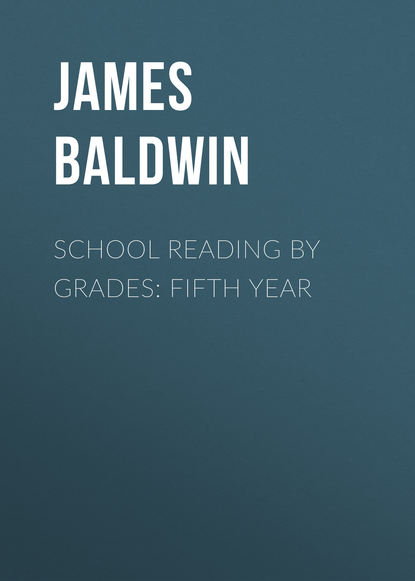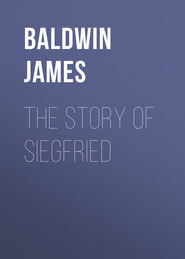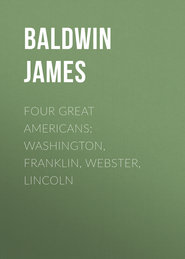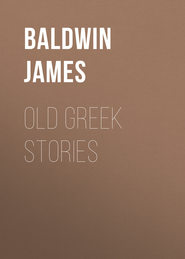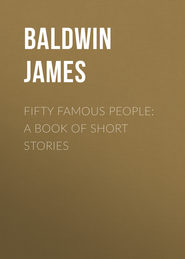По всем вопросам обращайтесь на: info@litportal.ru
(©) 2003-2024.
✖
School Reading By Grades: Fifth Year
Настройки чтения
Размер шрифта
Высота строк
Поля
Then Chiron took his lyre, and all the lads joined hands; and as he played, they danced to his measure, in and out, and round and round. There they danced hand in hand, till the night fell over land and sea, while the black glen shone with their broad white limbs, and the gleam of their golden hair.
And the lad danced with them, delighted, and then slept a wholesome sleep, upon fragrant leaves of bay, and myrtle, and marjoram, and flowers of thyme; and rose at the dawn, and bathed in the torrent, and became a schoolfellow to the heroes’ sons. And in course of time he forgot Iolcus, and Æson his father, and all his former life. But he grew strong, and brave, and cunning, upon the rocky heights of Pelion, in the keen, hungry, mountain air. And he learned to wrestle, and to box, and to hunt, and to play upon the harp; and, next, he learned to ride, for old Chiron often allowed him to mount upon his back; and he learned the virtues of all herbs, and how to cure all wounds; and Chiron called him Jason the healer, and that is his name until this day.
– From “The Heroes; or Greek Fairy Tales,” by Charles Kingsley.
THE DOG OF MONTARGIS
I
In the old castle of Montargis in France, there was once a stone mantelpiece of workmanship so rare that it was talked about by the whole country. And yet it was not altogether its beauty that caused people to speak of it and remember it. It was famous rather on account of the strange scene that was carved upon it. To those who asked about its meaning, the old custodian of the castle would sometimes tell the following story.
It happened more than five hundred years ago, when this castle was new and strong, and people lived and thought in very different sort from what they do now. Among the young men of that time there was none more noble than Aubrey de Montdidier, the nephew of the Count of Montargis; and among all the knights who had favor at the royal court, there was none more brave than the young Sieur de Narsac, captain of the king’s men at arms.
Now these two men were devoted friends, and whenever their other duties allowed them, they were sure to be in each other’s company. Indeed, it was a rare thing to see either of them walking the streets of Paris alone.
“I will meet you at the tournament to-morrow,” said Aubrey gayly, one evening, as he was parting from his friend.
“Yes, at the tournament to-morrow,” said De Narsac; “and be sure that you come early.”
The tournament was to be a grand affair. A gentleman from Provence was to run a tilt with a famous Burgundian knight. Both men were noted for their horsemanship and their skill with the lance. All Paris would be out to see them.
When the time came, De Narsac was at the place appointed. But Aubrey failed to appear. What could it mean? It was not at all like Aubrey to forget his promise; it was seldom that he allowed anything to keep him away from the tournament.
“Have you seen my friend Aubrey to-day?” De Narsac asked this question a hundred times. Everybody gave the same answer, and wondered what had happened.
The day passed and another day came, and still there was no news from Aubrey. De Narsac had called at his friend’s lodgings, but could learn nothing. The young man had not been seen since the morning before the tournament.
Three days passed, and still not a word. De Narsac was greatly troubled. He knew now that some accident must have happened to Aubrey. But what could it have been?
Early in the morning of the fourth day he was aroused by a strange noise at his door. He dressed himself in haste and opened it. A dog was crouching there. It was a greyhound, so poor that its ribs stuck out, so weak that it could hardly stand.
De Narsac knew the animal without looking at the collar on its neck. It was Dragon, his friend Aubrey’s greyhound, – the dog who went with him whenever he walked out, the dog who was never seen save in its master’s company.
The poor creature tried to stand. His legs trembled from weakness; he swayed from side to side. He wagged his tail feebly, and tried to put his nose in De Narsac’s hand. De Narsac saw at once that he was half starved; that he had not had food for a long time.
He led the dog into his room and fed him some warm milk. He bathed the poor fellow’s nose and bloodshot eyes with cold water. “Tell me where is your master,” he said. Then he set before him a full meal that would have tempted any dog.
The greyhound ate heartily, and seemed to be much stronger. He licked De Narsac’s hands. He fondled his feet. Then he ran to the door and tried to make signs to his friend to follow him. He whined pitifully.
De Narsac understood. “You want to lead me to your master, I see.” He put on his hat and went out with the dog.
Through the narrow lanes and crooked streets of the old city, Dragon led the way. At each corner he would stop and look back to make sure that De Narsac was following. He went over the long bridge – the only one that spanned the river in those days. Then he trotted out through the gate of St. Martin and into the open country beyond the walls.
In a little while the dog left the main road and took a bypath that led into the forest of Bondy. De Narsac kept his hand on his sword now, for they were on dangerous ground. The forest was a great resort for robbers and lawless men, and more than one wild and wicked deed had been enacted there.
But Dragon did not go far into the woods. He stopped suddenly near a dense thicket of briers and tangled vines. He whined as though in great distress. Then he took hold of the sleeve of De Narsac’s coat, and led him round to the other side of the thicket.
There under a low-spreading oak the grass had been trampled down; there were signs, too, of freshly turned-up earth. With moans of distress the dog stretched himself upon the ground, and with pleading eyes looked up into De Narsac’s face.
“Ah, my poor fellow!” said De Narsac, “you have led me here to show me your master’s grave.” And with that he turned and hurried back to the city; but the dog would not stir from his place.
That afternoon a company of men, led by De Narsac, rode out to the forest. They found in the ground beneath the oak what they had expected – the murdered body of young Aubrey de Montdidier.
“Who could have done this foul deed?” they asked of one another; and then they wept, for they all loved Aubrey.
They made a litter of green branches, and laid the body upon it. Then, the dog following them, they carried it back to the city and buried it in the king’s cemetery. And all Paris mourned the untimely end of the brave young knight.
II
After this, the greyhound went to live with the young Sieur de Narsac. He followed the knight wherever he went. He slept in his room and ate from his hand. He seemed to be as much devoted to his new master as he had been to the old.
One morning they went out for a stroll through the city. The streets were crowded; for it was a holiday and all the fine people of Paris were enjoying the sunlight and the fresh air. Dragon, as usual, kept close to the heels of his master.
De Narsac walked down one street and up another, meeting many of his friends, and now and then stopping to talk a little while. Suddenly, as they were passing a corner, the dog leaped forward and planted himself in front of his master. He growled fiercely; he crouched as though ready for a spring; his eyes were fixed upon some one in the crowd.
Then, before De Narsac could speak, he leaped forward upon a young man whom he had singled out. The man threw up his arm to save his throat; but the quickness of the attack and the weight of the dog caused him to fall to the ground. There is no telling what might have followed had not those who were with him beaten the dog with their canes, and driven him away.
De Narsac knew the man. His name was Richard Macaire, and he belonged to the king’s bodyguard.
Never before had the greyhound been known to show anger towards any person. “What do you mean by such conduct?” asked his master as they walked homeward. Dragon’s only answer was a low growl; but it was the best that he could give. The affair had put a thought into De Narsac’s mind which he could not dismiss.
Within less than a week the thing happened again. This time Macaire was walking in the public garden. De Narsac and the dog were some distance away. But as soon as Dragon saw the man, he rushed at him. It was all that the bystanders could do to keep him from throttling Macaire. De Narsac hurried up and called him away; but the dog’s anger was fearful to see.
It was well known in Paris that Macaire and young Aubrey had not been friends. It was remembered that they had had more than one quarrel. And now the people began to talk about the dog’s strange actions, and some went so far as to put this and that together.
At last the matter reached the ears of the king. He sent for De Narsac and had a long talk with him. “Come back to-morrow and bring the dog with you,” he said. “We must find out more about this strange affair.”
The next day De Narsac, with Dragon at his heels, was admitted into the king’s audience room. The king was seated in his great chair, and many knights and men at arms were standing around him. Hardly had De Narsac stepped inside when the dog leaped quickly forward. He had seen Macaire, and had singled him out from among all the rest. He sprang upon him. He would have torn him in pieces if no one had interfered.
There was now only one way to explain the matter.
“This greyhound,” said De Narsac, “is here to denounce the Chevalier Macaire as the slayer of his master, young Aubrey de Montdidier. He demands that justice be done, and that the murderer be punished for his crime.”
The Chevalier Macaire was pale and trembling. He stammered a denial of his guilt, and declared that the dog was a dangerous beast, and ought to be put out of the way. “Shall a soldier in the service of the king be accused by a dog?” he cried. “Shall he be condemned on such testimony as this? I, too, demand justice.”
“Let the judgment of God decide!” cried the knights who were present.
And so the king declared that there should be a trial by the judgment of God. For in those rude times it was a very common thing to determine guilt or innocence in this way – that is, by a combat between the accuser and the accused. In such cases it was believed that God would always aid the cause of the innocent and bring about the defeat of the guilty.
The combat was to take place that very afternoon in the great common by the riverside. The king’s herald made a public announcement of it, naming the dog as the accuser and the Chevalier Macaire as the accused. A great crowd of people assembled to see this strange trial by the judgment of God.
The king and his officers were there to make sure that no injustice was done to either the man or the dog. The man was allowed to defend himself with a short stick; the dog was given a barrel into which he might run if too closely pressed.
At a signal the combat began. Macaire stood upon his guard while the dog darted swiftly around him, dodging the blows that were aimed at him, and trying to get at his enemy’s throat. The man seemed to have lost all his courage. His breath came short and quick. He was trembling from head to foot.
Suddenly the dog leaped upon him and threw him to the ground. In his great terror he cried to the king for mercy, and acknowledged his guilt.
“It is the judgment of God!” cried the king.





